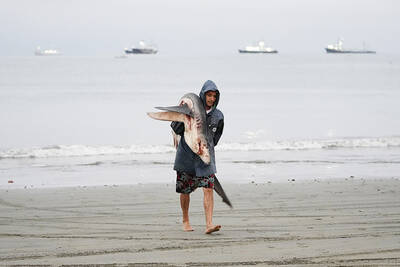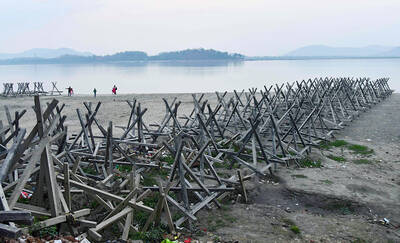With the glittering parades, towering floats and sultry samba postponed by the Omicron variant of SARS-CoV-2, Brazil is to have a carnival week without much “carnival” this year — bad news for a tourism industry battered by the COVID-19 pandemic.
In a world without COVID-19, this would have been the week that a deluge of tourists — more than 2.1 million in 2020 — descended on Rio de Janeiro for street parties and all-night parades.
Instead, industry experts predict that Rio de Janeiro and other tourist destinations will be relatively low key, with a smaller number of visitors — mainly Brazilians traveling domestically.

Photo: AP
That is adding to the agony of a tourism industry just starting to recover from near-collapse in 2020.
“It’s been very traumatic,” said Alexandre Sampaio, head of hotel and restaurant federation FBHA, citing official figures showing that the tourism industry’s revenues plunged 35 percent in 2020.
The industry rebounded only partially last year, increasing about 20 percent.
Carnival week is still to have concerts, parties and balls in Rio de Janeiro — limited to 70 percent capacity, with vaccine and mask requirements.
Omicron has led to carnival street parties being canceled for the second straight year, and the samba school parade competition has been postponed until April.
“We’ll see some revenue” from the rescheduled parades, “but it won’t come anywhere near pre-pandemic levels,” said Fabio Bentes, an economist at the National Confederation of Trade in Goods, Services and Tourism (CNC).
Bentes predicts that revenue from carnival week will be one-third below pre-pandemic levels.
His research indicates that the tourism industry, which accounted for 7.7 percent of Brazil’s economy before the pandemic — 551.5 billion reals (US$106.82 billion) in direct and indirect revenue in 2019 — has lost US$94.1 billion in the past two years and more than 340,000 jobs.
Experts say that the drop in foreign tourists has been partially offset by more Brazilians traveling domestically, themselves wary of flying overseas.
“We used to mainly travel abroad. But we had been isolated so long, we wanted to start traveling again. So we decided to start with Brazil,” said Maria Augusta Rosa, 40, a civil servant from the central city of Goiania who was vacationing in Rio de Janeiro.
Experts predict a full recovery for Brazil’s tourism sector only in 2023 — if there are no more unpleasant surprises in the meantime.
In Manaus, the “capital of the Amazon,” Remy Harbonnier, a French tour operator who specializes in rainforest lodges and river cruises, said that client and revenue numbers at his company, Heliconia, remain about 80 percent off pre-pandemic levels.
He hopes to cut that to 50 percent this year, but that will depend on events, he said.
“Now we’re worried about the situation in Ukraine. It’s a bit scary,” Harbonnier said. “We just try to tell ourselves, we’ve gotten through two years of COVID-19, we’ll get through an armed conflict in Europe.”

WAKE-UP CALL: Firms in the private sector were not taking basic precautions, despite the cyberthreats from China and Russia, a US cybersecurity official said A ninth US telecom firm has been confirmed to have been hacked as part of a sprawling Chinese espionage campaign that gave officials in Beijing access to private texts and telephone conversations of an unknown number of Americans, a top White House official said on Friday. Officials from the administration of US President Joe Biden this month said that at least eight telecommunications companies, as well as dozens of nations, had been affected by the Chinese hacking blitz known as Salt Typhoon. US Deputy National Security Adviser for Cyber and Emerging Technologies Anne Neuberger on Friday told reporters that a ninth victim

Russia and Ukraine have exchanged prisoners of war in the latest such swap that saw the release of hundreds of captives and was brokered with the help of the United Arab Emirates (UAE), officials said on Monday. Ukrainian President Volodymyr Zelenskiy said that 189 Ukrainian prisoners, including military personnel, border guards and national guards — along with two civilians — were freed. He thanked the UAE for helping negotiate the exchange. The Russian Ministry of Defense said that 150 Russian troops were freed from captivity as part of the exchange in which each side released 150 people. The reason for the discrepancy in numbers

A shark attack off Egypt’s Red Sea coast killed a tourist and injured another, authorities said on Sunday, with an Italian Ministry of Foreign Affairs source identifying both as Italian nationals. “Two foreigners were attacked by a shark in the northern Marsa Alam area, which led to the injury of one and the death of the other,” the Egyptian Ministry of Environment said in a statement. A source at the Italian foreign ministry said that the man killed was a 48-year-old resident of Rome. The injured man was 69 years old. They were both taken to hospital in Port Ghalib, about 50km north

POWER PLAY: The dam is planned to more than triple the 88.2 billion kilowatt-hours designed capacity of the Three Gorges Dam, which is currently the world’s largest China has approved the construction of what would be the world’s largest hydropower dam, launching an ambitious project on the eastern rim of the Tibetan plateau that could affect millions downstream in India and Bangladesh. The dam, which would be in the lower reaches of the Yarlung Zangbo River, could produce 300 billion kilowatt-hours of electricity annually, according to an estimate provided by Power Construction Corp of China in 2020. That would more than triple the 88.2 billion kilowatt-hours designed capacity of the Three Gorges Dam, currently the world’s largest, in central China. The project would play a major role in meeting China’s